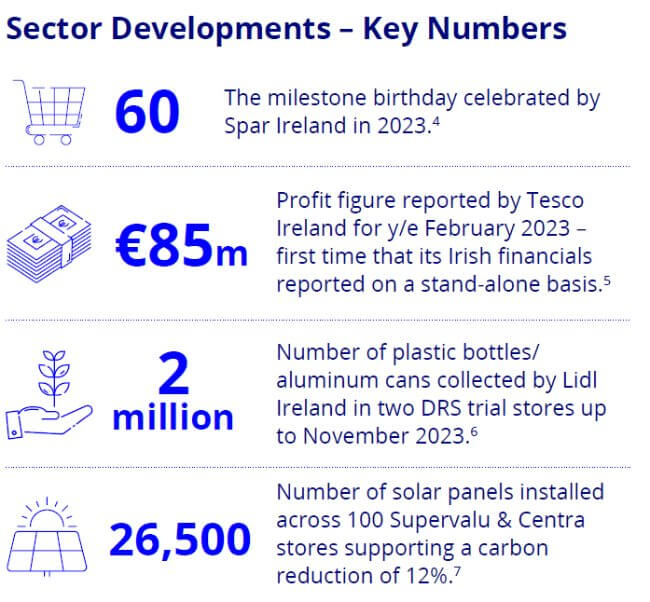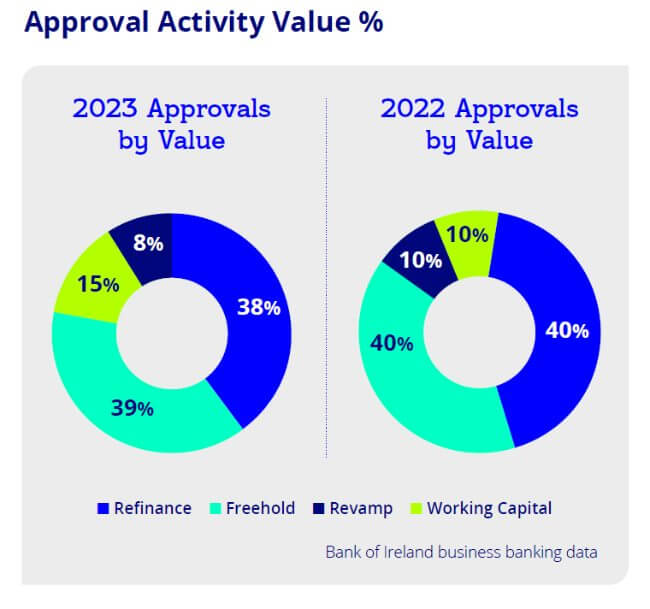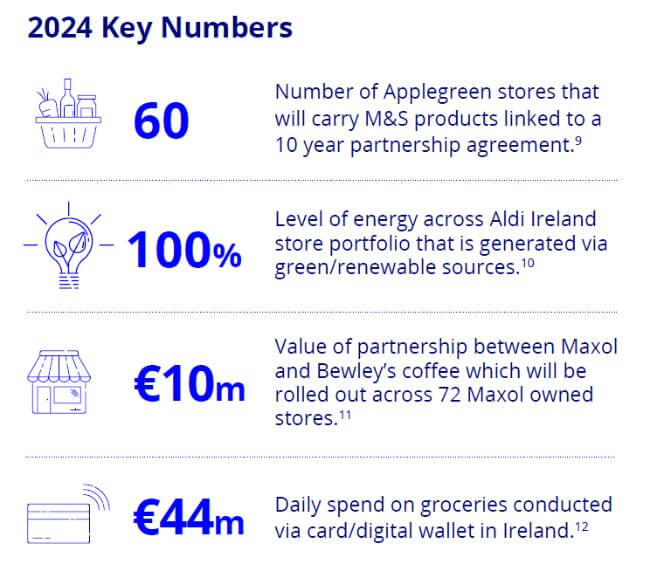The Irish retail sector delivered a robust performance in the midst of an inflationary environment. Looking to 2024, Bank of Ireland head of Retail Sector Owen Clifford believes the sector will prove resilient to economic shocks.
“The Grocery & Convenience retail sector performed strongly in 2023 and a robust investment outlook is projected for 2024 linked to store purchase/revamp activity, succession planning, partnership development and refinance opportunities”
Retail Convenience: 2023 Review
- Robust performance: Robust performance delivered by the sector in 2023. A shift in consumer behaviour to increased frequency patterns coupled with increased engagement with own-brand ranges.
- Inflation: The unprecedented level of food inflation became the subject of political focus – easing in commodity prices started to filter through to shop shelves in H2 2023.
- Consolidation: Increased consolidation has become a feature of the market with larger grocery/fuel operators expanding their store network and diversifying their sales mix.
2023 Key Trends
- Strong growth in take-home grocery sales continued. Whilst inflation levels across the sector hit unprecedented levels (17%) linked to post Covid-19 supply and Ukraine war issues in H1, a significant retraction in same occurred in H2 reflecting a decrease in international commodity prices (Kantar). The Competition and Consumer Protection Commission (“CCPC”) also reported that there was “no evidence to suggest excessive pricing in the Irish grocery market”. (CCPC)
- Dunnes continues to hold the number 1 position in respect of grocery market share driven by a particularly strong performance in the wider Dublin region. Tesco market share increased in the period reflecting the integration of the Joyce group stores within their portfolio.
- The large supermarket operators have been proactive in addressing cost of living concerns with targeted ad campaigns and voucher offers being strongly promoted. An expanded own-brand offering has also resonated with consumers with c10.5% growth delivered across unbranded lines in the pivotal Christmas period. (Kantar)
Margin growth and preservation have become an imperative for retailers linked to an increased cost framework driven by personnel, insurance and energy overheads.
Key Activity in the Sector in 2023
- Shopping patterns reflected cost of living concerns with increased frequency (shopping little & often) becoming a feature of the market. As expected, food inflation, linked to a significant decline in international food commodity prices in recent months retracted significantly in H2 2023.
- As many food/drink manufacturers absorbed increased costs in 2023 to remain price competitive – it is expected that robust price negotiations will be a feature of the market in early 2024. Balancing consumer and supplier relationships will be key in this respect.
- Retailers are continuing to implement pragmatic succession planning structures to ensure that appropriate long-term value is delivered from their business. COVID-19 has been a catalyst for some retailers to investigate future options in respect of both ownership and operational models.
- Recent studies across Europe have demonstrated that saving money on food remains a top priority across all income groups. This has led to increased engagement with own brand products and a discernible improvement in own-brand range/ options across the sector. The proactive delivery of premium, healthy and sustainable products across the own-brand range will be required to meet customer expectations and preserve retailer margin. (McKinsey)
Sector Developments: Investment & Economic
- A significant level of new store openings/extensive store revamps occurred in 2023 across all regions supporting job creation and the wider Irish business eco-system. This reflects both the competitive nature, robust financial health and positive outlook of the leading brands in respect of the Irish market.
- The increased cost and regulatory burden presented by the proposed living wage structure, pension autoenrollment and insurance in a competitive environment has led to an up weighted focus on margin development/ preservation from retailers, wholesalers and their advisors. Recruitment and retention of personnel in a “full-employment” environment continues to be a key challenge for the sector.
- Consolidation and cross-sectoral partnerships remains a feature of the wider Irish grocery/convenience/forecourt market. Tesco integrating nine Joyce group stores within their network, Applegreen and Marks & Spencers agreeing a 10 year “brand within a brand” partnership and Musgrave purchasing fine-food distributor, Ritter Courivaud a flavour of some of the transaction activity in 2023. Individual store sale activity increased significantly linked to succession planning, landlord de-leveraging and independent retailers expanding their store portfolios.
- The de-carbonisation of end to end operations remains a key focus for leading operators linked to supplier, Government and consumer expectations/requirements. Multi-million euro investments linked to improving energy efficiency profile across the fleet, logistics and store network was a feature of sector announcements/ strategies in 2023. The requirements of International suppliers seeking to reduce their scope 3 emission profile will continue to act as a driver/incentive in the green transition of the Irish grocery/convenience sector.
2024 Retail Convenience Outlook
- Robust Outlook: Overall a resilient sector to economic shocks; Strong sales performance to continue but increased focus on margin preservation and cost management required to maintain profitability levels/leeway for investment.
- Funding Activity: Strong active pipeline of store purchase and associated revamp proposals– retailers recognise that customer experience/excellent standards will be key to attract and retain market share.
- ESG Investment: Increased investment in environmentally focused store network, waste management, circular operational framework and fleet fuel consumption to support targeted reduction in carbon emissions from the sector.
Market
- In a competitive labour market – sourcing and retaining the best people is vital to sustain a retail business. A structured employee development plan that incorporates role variety, up-skill opportunities and competitive remuneration needs to be embedded within the culture of the business. The smart use of digital/automation tools can deliver the dual goal of increased efficiency and an improved working environment.
- Linked to the development of all personnel within the sector, the Irish chapter of LEAD has been recently established with the goal of attracting, retaining and advancing women in the retail and consumer goods industry through education, leadership and male allyship.
- Significant revamp programme will continue to be rolled out in 2024 nationwide by leading grocery operators as the ever more discerning consumer seeks excellence in store standards. Movement on revamp costs linked to fluctuating material supply base to be monitored closely.
- Detailed analysis pre and post revamp will be an imperative to ensure that a maximum return on investment is delivered via sales mix improvement, margin growth and cost saving. The “localisation” trend will continue with store revamps taking a more bespoke, community focused approach.
- As consumers seek cheaper alternatives across some product lines, all leading operators recognise that a strong, diversified own-brand offering will be critical to maintain customer engagement as the inflationary cycle continues. However, Own-brand is not all about price/value – the development of premium, proprietary in-house food solutions can provide a strong margin-generating differentiation point for retailers when delivered effectively.
ESG
- Irish retailers are cognisant that a robust strategy for the de-carbonisation of their business model is required to meet Government, investor and consumer expectations/ requirements into the future. Corporate social responsibility linked to sustainable and environmentally friendly in-store activities will therefore be a key area of focus for all retailers – energy efficient equipment, elimination of single-use plastic, improved recycling facilities and reduction of food waste. This will enable an improved cost base whilst meeting consumer expectations in respect of ethical trading. The proposed rollout of the Irish deposit return scheme under the auspices of Re-Turn will be monitored with interest. The commencement date is 1st February 2024.
- Studies have identified that c90% of all emissions related to Retail are Scope 3 – linked to suppliers/consumers as opposed to direct emissions from the business itself/ purchased energy, Scope 1 and 2 (British Retail Consortium). To move the dial on Scope 3, retailers are starting to establish joint initiatives and incentivisation plans with their suppliers to support improved emission targets and the sharing of related data. In respect of consumer engagement – apps/tools that support customers to set and monitor climate targets for their shopping baskets are also on the horizon.
Funding Activity
- Store purchase strategies will continue to develop in 2024. COVID-19 has been the catalyst for increased levels of succession planning/retirement which is driving this activity.
- Revamp funding to continue with a particular focus on energy efficient equipment and processes.
- Robust refinance activity projected linked to loan book purchasers seeking to deleverage.
The Sectors Team is a differentiator for Bank of Ireland in that the sector heads are recruited directly from industry and bring perspective that only first-hand experience can provide. To learn more about Bank of Ireland’s sectoral expertise, click here
Retail Convenience 2023 Insights /
2024 Outlook
2024 Outlook
View
Print
Main image at top: Eduardo Soares on Unsplash








